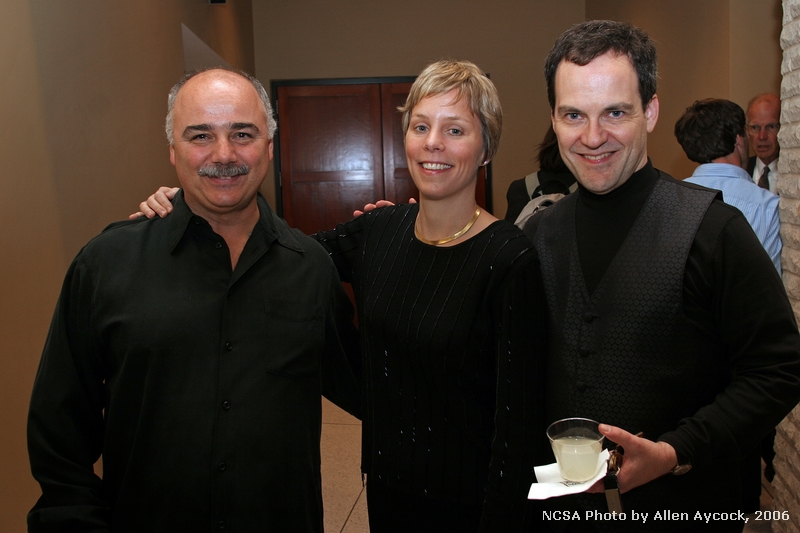Iíve said it many times: I have never liked conducting. My deafness is acute enough that I have to rely on my instincts and experience to get the best out of a performance, which can be risky. But thatís not the biggest problem, because Iíve developed a number of tricks to compensate. The real issue is my disinterest in memorizing music. Memorization is an essential tool for a conductor, but not particularly critical for a composer. Or, I should say, memorizing oneís own music is practically second nature. Memorizing the music of others requires work, work that I find truly tedious.
Iíve been able to get around the memory issues by being an excellent reader: I can scan a score quickly and imagine it in pretty fine detail. But my deteriorating eyesight is making that skill irrelevant when Iím on the podium. Now when I look down at a music stand, sometimes all I see is a blur.
So it is a constant puzzle to me that musicians keep asking me to conduct them in new works Ė and even more puzzling that I keep agreeing to do it. I wonder if I am being too self-critical, but I donít think so. I know my skills: I move well, give a clear beat, and communicate in a way that brings out the best in most people. But the impediments posed by my poor memory and my declining eyesight, which have no effect on my composing, make me feel like conducting is a waste of time. Iím not so interested in working that hard on something I know will never be as good as Iíd want it to be.
All of this comes to mind following the performance I gave this past week. I conducted professional ensembles in three new works by Sebastian Currier, Luciano Berio and Augusta Read Thomas, and a student ensemble in another work by Thomas.
The Currier got an outstanding performance: metric modulations, outrageous polyrhythms and radical shifts in direction were all accomplished with a minimum of fuss and a maximum of musicality.
As good as the Currier was, the Berio was absolutely dreadful. About a third of the way through, I misread a time signature change. It wasnít until two measures later that I realized something had gone amiss, as the players started to adjust to where they thought I was. In that situation, one must continue reading forward in the score, while simultaneously scanning backward to see what has gone wrong so adjustments may be made accordingly. A few years ago, I would have been able to fix the problem immediately, but my eyesight now has deteriorated to the point that I was unable to see the page clearly enough to figure out what had happened. Several excruciating measures went by with the musicians playing off of one another by a beat or two, while I kept the beat going in an amorphous time signature. Finally, I decided to latch onto the soprano and bring everyone in line with her, regardless of who was ďright.Ē Things soon came together, and we finished well Ė in fact, one bar that I had never been satisfied with in rehearsal went perfectly.
If the piece had been completely committed to memory, nothing would have gone wrong Ė and even if something bad had happened, I would have been able to fix it instantly. And thatís what keeps me from being the kind of conductor I think all music deserves.
Ironically, many people in the audience commented on how beautiful the Berio was afterwards. Two people who knew the piece quite well knew that something was wrong, but not exactly what. Which goes to show how tough life is for critics, who are often expected to assess how a performance went without knowing the music. In this case, the musicians Ė all outstanding, highly experienced professionals -- compensated for being lost by bringing the most beautiful sounds possible from their instruments. And, of course, I projected nothing but utter confidence and musicality from the podium throughout.
But I canít help feeling that I took the Berio for granted, since it was the easiest piece on the program to put together in rehearsal.
At least I saved the worst performance for the one composer who is no longer with us.
The other two works were by guest composer Augusta Read Thomas: her concertino
Passion Prayers, which got a knockout performance from the solo cellist, Zvi Plesser, and
The Final Soliloquy of the Interior Paramour, which was played gorgeously by the student ensemble. My command of these two pieces was fine, though not on a par with the highest standards one could wish for. I was able to shape these very challenging works convincingly. But thatís not really enough, as far as Iím concerned.
Augusta was a great guest, working hard to convey her array of ideas, beliefs and experiences to our students in three intensive seminars. She gave them a lot to think about, and a lot to aspire to. Her scat-like renditions of what she is hearing in her imagination are particularly enjoyable and revealing.
 l to r: violinist Joseph Genualdi, Augusta Read Thomas, part-time conductor
l to r: violinist Joseph Genualdi, Augusta Read Thomas, part-time conductorIt is common to describe her music as intensely colorful, but that description can be misleading. The carefully calibrated timbral designs are only part of the equation: she has an outstanding sense of harmonic movement, spacing and balance that plays a major role in the spectacularly sensuous results. This mastery of harmony was something I came to appreciate more deeply in the course of performing her works.
Meanwhile whatís next for me?
Time to make an appointment with the eye doctor.



